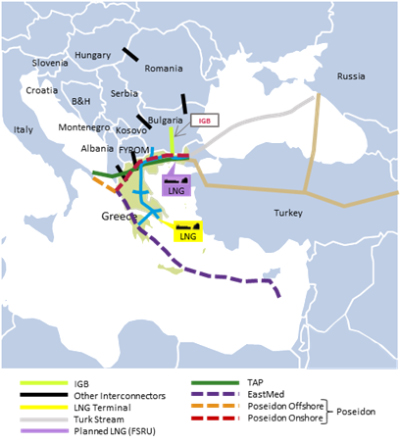
Funding is absorbed by the ICGB in separate tranches under each program only after field inspections and audits of the necessary documentation, so as to certify the quality performance of all activities for the construction and implementation of the IGB gas pipeline. To date, the last tranche of the long-term loan has been provided by the EIB to the ICGB after a successful audit by the independent experts from RSK Environment Limited.
The independent transmission operator ICGB absorbed the last tranche of the long-term loan from the European Investment Bank (EIB) for the implementation of the intersystem gas connection Greece-Bulgaria.
The interconnector became operational on October 1, 2022, and nearly 1/3 of the quantities needed to ensure the internal consumption of natural gas for Bulgaria are supplied through it. The total value of the project is EUR 253 million, which is secured by the funds of the shareholders BEH and IGI Poseidon, EUR 109.9 million in the form of a long-term loan from the EIB, free financing in the amount of EUR 45 million under the European Energy Program for Recovery (EEPR) and 39 million euros allocated under the Operational Program "Innovations and Competitiveness" (OPIC 2014-2020).
Funding is absorbed by the ICGB in separate tranches under each program only after field inspections and audits of the necessary documentation, so as to certify the quality performance of all activities for the construction and implementation of the IGB gas pipeline. To date, the last tranche of the long-term loan has been provided by the EIB to the ICGB after a successful audit by the independent experts from RSK Environment Limited.
By the end of the calendar year, the applications for the utilization of the last installments of the non-reimbursed financing under OPIC and EEPR for the implementation of the Greece-Bulgaria gas interconnector will be submitted.
Since the start of the construction phase at the end of 2019 until now, ICGB has undergone a total of 6 independent audits in line with the social and environmental commitments that the company must fulfill as part of the EIB financing conditions. All inspections were completed successfully, with no serious deviations from the set norms recorded.
In the phase of commercial operation of the gas pipeline, this type of independent audits - including in the field - will be carried out once a year. Part of the ICGB's commitments as the operator of the gas pipeline include the effective management of the project's impact on biodiversity in the regions through which the interconnector route passes. For this purpose, the company has introduced a 5-year monitoring period, during which the successful implementation of all restoration and bioregeneration activities from the construction phase will be tracked.
The IGB project (Greece-Bulgaria Intersystem Gas Connection) is implemented by the mixed investment company "ICGB" JSC, registered in Bulgaria in 2011 with shareholders BEH JSC (50%) and IGI Poseidon (50%). The joint shareholder IGI Poseidon is a company registered in Greece, with shareholders the Greek company DEPA International Projects S.A. (50%) and the Italian energy group Edison S.p.A (50%).
In accordance with its charter, ICGB JSC is the owner of the IGB gas pipeline, financing its implementation, distributing its transmission capacity and receiving revenues from the transmission of natural gas.
The IGB gas pipeline is connected to the Greek national gas transmission system (DESFA S.A.) and the Trans-Adriatic gas pipeline (TAP AG) in the area of Komotini (Greece), and to the Bulgarian gas transmission system (Bulgartransgaz EAD) in the area of Stara Zagora. The total length of the gas pipeline is 182 km, the diameter of the pipe - 32'' - and a design capacity of up to 3 billion m3/year. in the direction of Greece-Bulgaria. Depending on the market interest in using a larger capacity and the possibilities of the neighboring gas transmission systems, the capacity is designed to increase to 5 billion m3/year, with additional construction of a compressor station.
Source: Diana Zaykova, [email protected] , 0885/074 422, 0885/614 131; Rositza Donkova, [email protected] , 0888/343 661